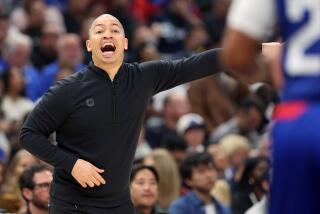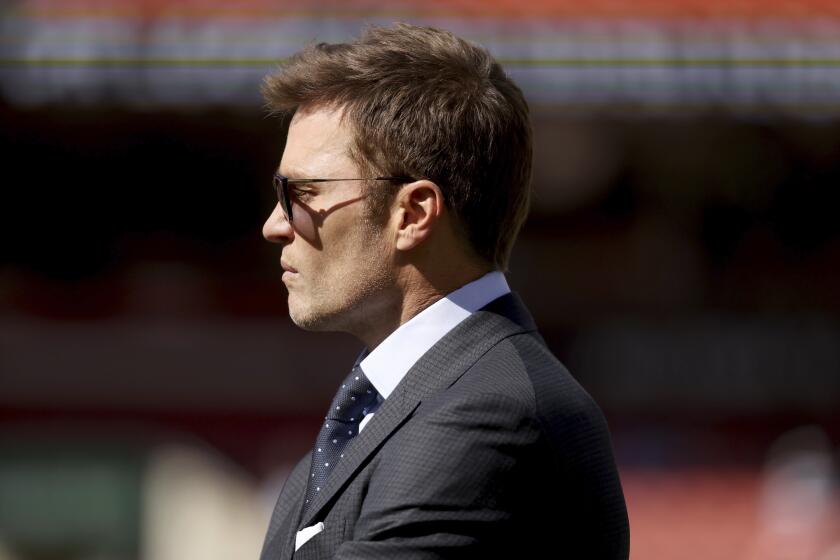Comparing Lakers fans and Clippers fans -- on the analyst’s couch
It’s suddenly fashionable to be a Clippers fan, while Lakers fans lick their wounds or, as is often the case with Lakers fans, hire someone to lick their wounds for them.
So go ahead, climb aboard that Clippers bandwagon. Just try not to honk a hamstring while you fight for a seat. And no, you can’t “borrow” my Heineken.
New Clippers followers should also be aware that when you adopt a new team you adopt a new worldview. After all, Yankees fans are as different from Cubs fans as Brewers fans are from Baptists.
Are Clippers fans emotionally different from Lakers fans, who hail from the same ZIP Codes and fill the same arena?
“Lakers fans are realists, while Clippers fans are optimists,” clinical psychologist Nancy Lee says, based on her professional interactions with followers of both franchises.
In fact, Lee sees several ways in which Lakers and Clippers fans are distinct from each other. She brings up “locus of control,” which I thought might be the new Lakers offense but turns out to be the way people view fate and accomplishment.
“Lakers fans have an internal locus of control,” she says. “This means they feel responsible for their own destiny. They attribute success to hard work and perseverance.
“Clippers fans have a higher external locus of control. So they believe that fate, chance or luck determine events.”
Ring true? Sounds about right to me. As with any generalizations, there can be widespread exceptions. And as they say in the pharmaceutical ads, if symptoms persist, see a doctor.
By the way, if you have no locus of control whatsoever, you’re probably in the entertainment industry — or on my Little League team.
By and large I see a lot of truth to Lee’s insights, which she gleaned from treating fans and players for more than two decades in her Beverly Hills practice.
“Lakers fans thrive on power, prestige and predictability,” she explains. “Clippers fans value ideals and they cope better with ambiguity, spontaneity and misfortune.”
Well, they’ve certainly had plenty of ambiguity and misfortune.
And Lakers fans are traditionalists, she says, with “a strong psychological identification with a group they see as successful.”
“Clippers fans are largely nontraditional renegades who identify with the underdogs.”
Admittedly, the Lakers-Clippers relationship is a rivalry in progress, and seems to change almost hourly as the Clippers build success and respect. As the franchises’ fortunes turn, so might their fan bases, Lee notes.
“If this success is sustained over the long haul, it would be expected to see some Lakers fans defect to [the Clippers’] side, particularly those who need to psychologically identify with the victors,” she says.
David Carter, a professor of sports business at USC, already sees a change in expectations.
“Over the years, the Clippers fans have been hopeless romantics and Lakers fans have just been romantics,” he says. The Clippers are “a franchise we’ve come to know as the Bad News Bears, and now they’ve become Clippers 2.0.
“I don’t think they even need to make it to the Finals this year for fans to think this has been a good year for them, and to think they have the chance to be good for a long time.”
Lee is quick to note similarities between the two groups of fans, and generally believes that, by virtue of sharing a city, the fans are more similar than you might expect.
For example, fans of both teams are psychologically healthier than non-fans of similar age, lifestyle and income.
“Studies show that sports fans suffer less depression and alienation than non-sports fans,” she says.
Lee also says that Lakers and Clippers fans experience a surge in their self-esteem after their team wins, a mental lift that can last two days.
“Note that they use the phrase, ‘We won,’ ” she says of fans. “But when their team loses, they say, ‘They lost.’ It’s a distancing thing.”
There’s that bandwagon again, swerving up Fig ... oops, booooom, there goes the Pantry.
But Lee likes to point out that she doesn’t believe Clippers and Lakers fans hate each other the way, say, Lakers and Celtics fans do.
“It’s more like a good-natured sibling rivalry because of their mutual ties to Los Angeles,” she says.
Finally, the psychologist cites a study by Indiana University researchers that found that die-hard sports fans feel better about their own sex appeal.
“It gives sports fans a psychological framework,” she explains. “This really validates their enthusiasm.”
Oh, Doc, don’t encourage them.
More to Read
Go beyond the scoreboard
Get the latest on L.A.'s teams in the daily Sports Report newsletter.
You may occasionally receive promotional content from the Los Angeles Times.











